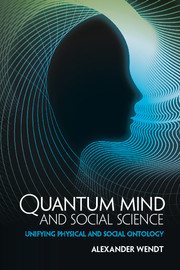Book contents
- Frontmatter
- Dedication
- Epigraph
- Contents
- Acknowledgments
- 1 Preface to a quantum social science
- Part I Quantum theory and its interpretation
- 2 Three experiments
- 3 Six challenges
- 4 Five interpretations
- Part II Quantum consciousness and life
- Part III A quantum model of man
- Part IV Language, light, and other minds
- Part V The agent-structure problem redux
- Conclusion
- Bibliography
- Index
3 - Six challenges
from Part I - Quantum theory and its interpretation
Published online by Cambridge University Press: 05 May 2015
- Frontmatter
- Dedication
- Epigraph
- Contents
- Acknowledgments
- 1 Preface to a quantum social science
- Part I Quantum theory and its interpretation
- 2 Three experiments
- 3 Six challenges
- 4 Five interpretations
- Part II Quantum consciousness and life
- Part III A quantum model of man
- Part IV Language, light, and other minds
- Part V The agent-structure problem redux
- Conclusion
- Bibliography
- Index
Summary
Despite scholarly consensus on the empirical facts, ever since its inception in the 1920s there has been deep disagreement about how to interpret quantum theory. “To interpret a physical theory is to say what the world would be like, if the theory were true.” All scientific theories require interpretation, since strictly speaking what they describe are our experiences of the world rather than the world itself. Thus, whether we are trying to explain or merely describe the world, we are always engaged in inference. To make inferences we need a context for interpretation. For any given claim this context is provided locally by related theories, more broadly by disciplinary paradigms, and ultimately by worldview claims about the nature of reality. The challenge in interpreting scientific theories is to integrate them into this hierarchy of knowledge. Usually this is not too difficult. New theories often require adjustments to nearby theories, but in doing so we can rely on paradigms to make them cohere. More rarely paradigmatic assumptions are themselves challenged, but in that case scientists can fall back on their worldview to make sense of the needed changes. By implication, the most difficult interpretive problems arise when our worldview is called into question, which leaves us without any frame of reference on which to fall back.
Quantum theory poses a worldview problem. Prior to the quantum revolution the classical worldview could not be tested scientifically and so it was essentially metaphysical. Even though it corresponded to our experience of material objects, we lacked proof that it adequately represented the deep structure of reality. By giving us access to that deep structure for the first time, quantum mechanics made it possible to do such a test, or “experimental metaphysics.” Unfortunately, the results seemed to contradict classical assumptions, at least on the sub-atomic level.
Information
- Type
- Chapter
- Information
- Quantum Mind and Social ScienceUnifying Physical and Social Ontology, pp. 58 - 69Publisher: Cambridge University PressPrint publication year: 2015
